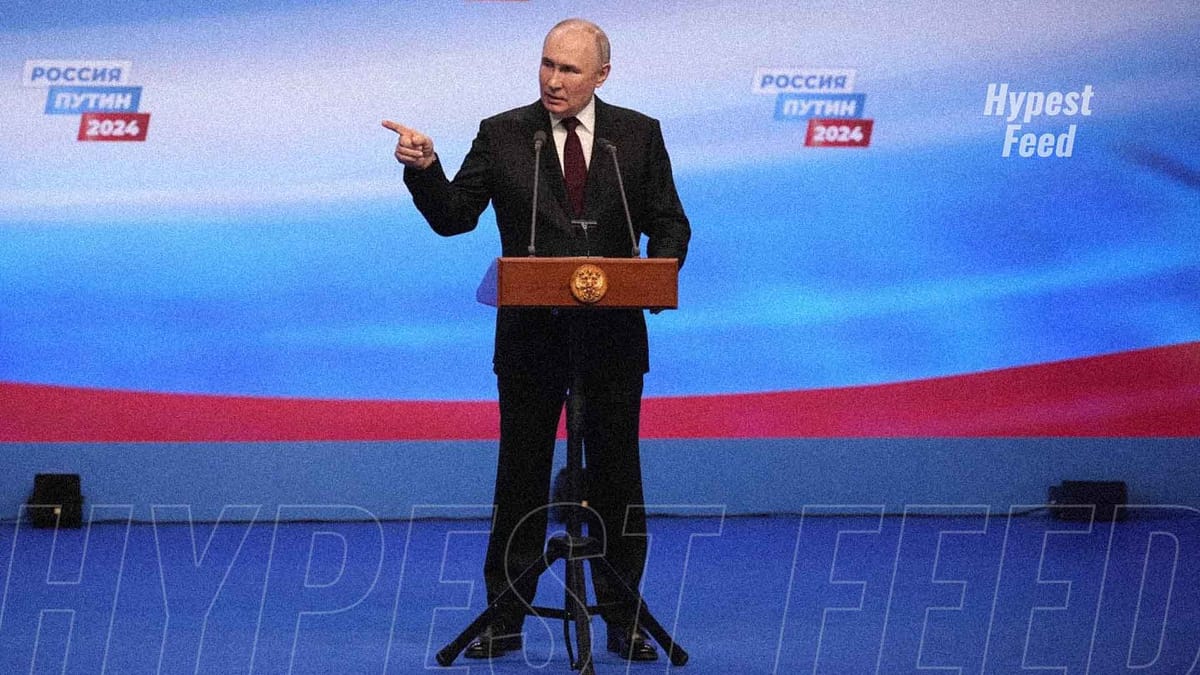Vladimir Putin secures a fifth term as Russian president with an overwhelming 87% victory, as reported by Russian exit polls. The absence of credible opposition candidates underscores the tight control the Kremlin exerts over Russia's political landscape, media, and electoral process.
International reactions vary, with Germany denouncing the election as a "pseudo-election," and the US criticizing it as "obviously not free nor fair." Ukrainian President Zelensky accuses Putin of power intoxication and perpetual rule-seeking.
During a post-election press conference, Putin reaffirms his commitment to continue the invasion of Ukraine. He also asserts that Russian democracy boasts greater legitimacy than the US, citing concerns over the American electoral system's vulnerabilities, such as the alleged ease of buying votes.
Notably, voting occurs in Russian-occupied territories of Ukraine, including Zaporizhzhia, Kherson, Donetsk, Luhansk, and Crimea. Despite controversies surrounding the election, voter turnout reaches 77%.
In the wake of his anticipated landslide victory in Russia's presidential election, President Putin takes aim at democracy in the United States, emphasizing Russia's purported transparency in contrast to Western systems. With Russian election officials declaring Putin's victory with over 87% of the vote, Putin asserts Russia's democratic process as superior, touting the use of online voting which reportedly attracted eight million voters.
During a press conference, Putin compares Russia's electoral sophistication favorably to the US, highlighting alleged flaws in the American system, particularly with mail-in voting, which he suggests can be manipulated for as little as $10 per vote. Notably, footage circulates showing Putin exercising his democratic right with a single keystroke.
Despite claims of transparency, independent watchdog Golos is barred from monitoring the election, and reports emerge of irregularities, including pressure on public sector employees to vote either at polling stations or online.
Putin's comments underscore ongoing tensions between Russia and Western democracies, as Russia's electoral process faces scrutiny amid allegations of manipulation and lack of accountability.
Ukrainian President Volodymyr Zelensky vehemently denounces Russia's recent presidential election as an illegitimate "imitation" during his nightly video address. Zelensky accuses Russian President Vladimir Putin of being intoxicated by power, alleging that Putin would resort to any means to extend his term, asserting that Putin should face trial in The Hague for his actions.
This election marked the first time Russia's national vote spanned three days, from March 15th to 17th, introducing an extended voting period. Notably, early voting occurred in the occupied territories of four Ukrainian regions: Zaporizhzhia, Kherson, Donetsk, and Luhansk.
In eastern Ukraine's Luhansk region, Putin purportedly secured an overwhelming 94.12% of the vote, while in Kherson, he garnered 88.12%. Similarly, in Donetsk and Zaporizhzhia, Putin reportedly received more than 90% of the vote, according to election commission reports.
Zelensky's condemnation reflects the ongoing tensions between Ukraine and Russia, as Ukraine perceives Russia's actions as a violation of its sovereignty and an affront to democratic principles. The results in the occupied territories raise concerns about the legitimacy of the election and further exacerbate tensions between the two neighboring countries.
Following the announcement of his victory, President Putin made a rare public mention of Alexei Navalny's name during a session with journalists, marking the first time in years Putin has addressed the prominent opposition figure.
Navalny, aged 47, passed away last month while serving a prison sentence in a remote penal colony above the Arctic Circle. He was convicted on charges of fraud, contempt of court, and extremism, widely criticized as politically motivated.
In a surprising revelation, Putin disclosed his support for a potential swap deal involving Navalny just days before his death, shedding light on a previously undisclosed aspect of the situation. This marks Putin's first acknowledgment of the proposed arrangement, confirming its existence. However, Putin outlined the condition that Navalny would be barred from returning to Russia.
The Russian leader refrained from disclosing details about potential exchange candidates, mentioning only "some people who are behind bars in Western countries." Putin's remarks suggest a degree of acceptance toward the circumstances, stating, "But when things like that happen you can not do anything about it – that’s life."
Putin's commentary on Navalny's case offers a glimpse into the complexities surrounding Russian politics and the government's handling of dissenting voices. The mention of Navalny's name in a public forum underscores the significance of his presence within the political landscape, even after his passing, while raising questions about the motives behind the proposed swap deal and its implications for Russian-Western relations.



Member discussion: